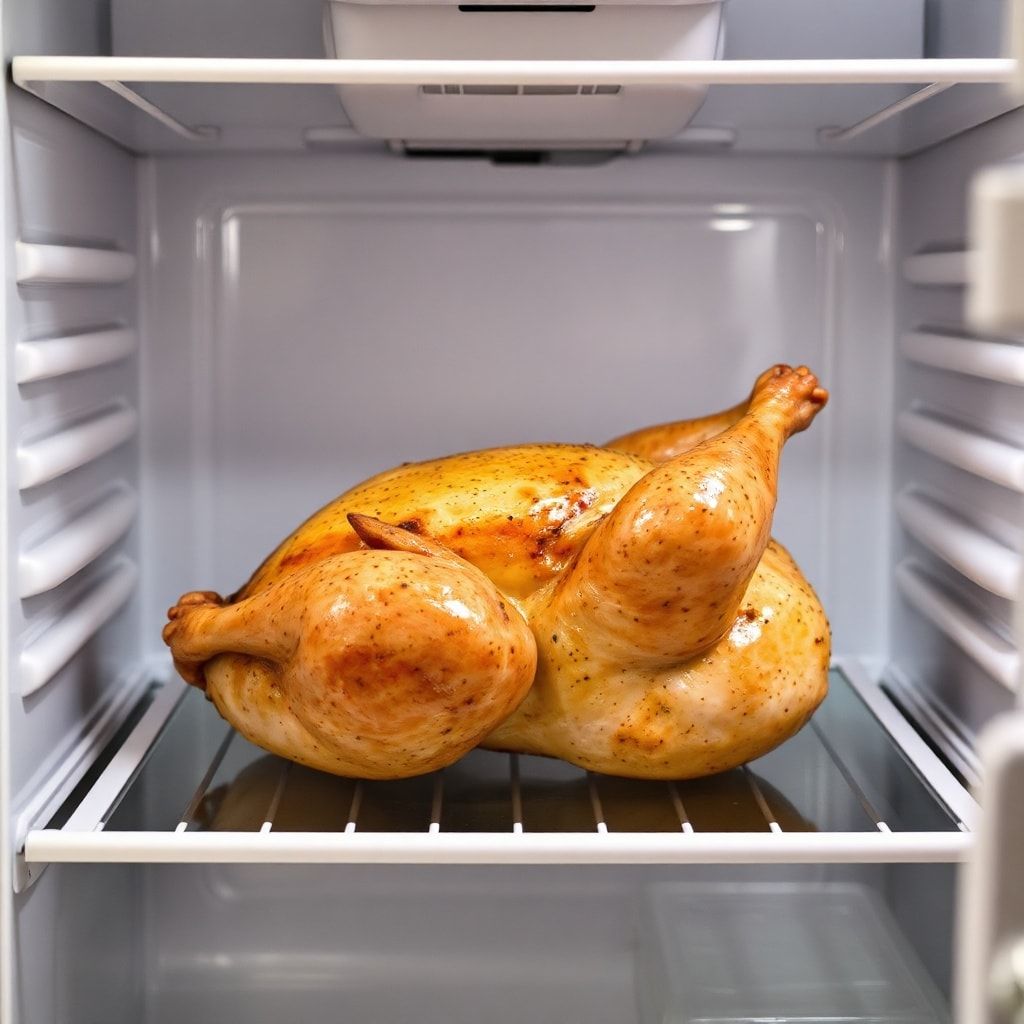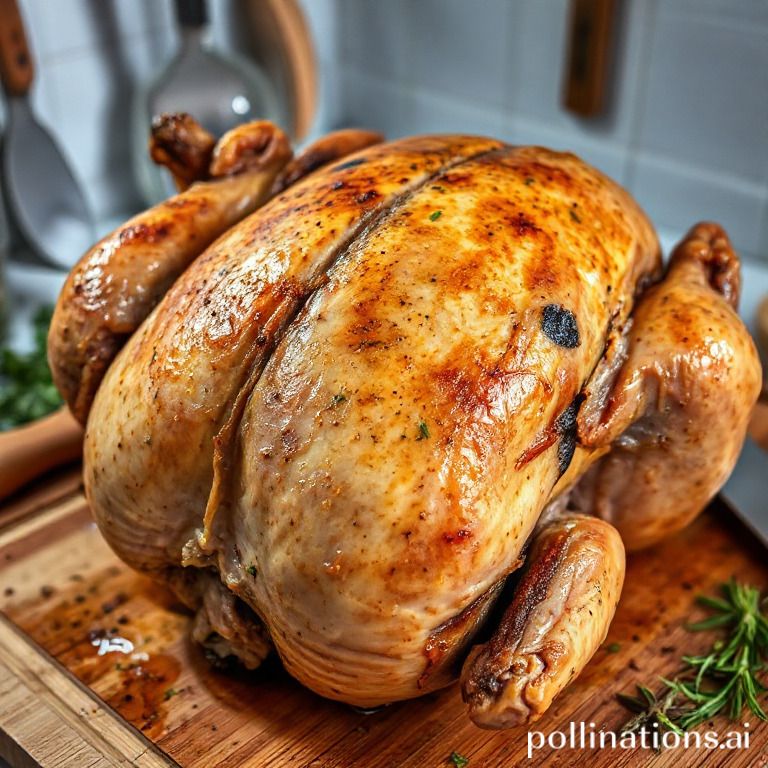If you’re wondering how long you can keep a rotisserie chicken in the fridge before it goes bad, you’ve come to the right place. We understand the importance of knowing the shelf life and expiration period of these delicious chickens.
It’s not uncommon to have leftovers or want to plan ahead for meals, but you also want to ensure that you’re consuming safe and fresh food. That’s why we’re here to provide you with the information you need. So, let’s dive in and discover the guidelines and recommendations for storing rotisserie chickens in the refrigerator.
ZenxyHoC Chick Feeder and Waterer Kit
Convenient Feeding and Hydration for Your Chickens
Factors Affecting the Shelf Life of Rotisserie Chickens
Rotisserie chickens are a popular and convenient food choice for many people and families. Although, it’s crucial to understand the factors that can impact how long they can be safely stored without spoiling or causing potential health risks. Here are the main factors that influence the shelf life of rotisserie chickens:
1. Temperature Control
Controlling the temperature is essential in determining how long rotisserie chickens can be stored. It’s recommended to keep them at or below 40°F (4°C) to slow down the growth of bacteria and maintain their quality. Storing the chicken at higher temperatures can accelerate the growth of harmful bacteria, which can lead to spoilage and possible foodborne illnesses.
2. Packaging and Storage Conditions
The packaging and storage conditions for rotisserie chickens also play a role in their shelf life. Typically, these chickens come in plastic containers or are wrapped in plastic film to preserve their freshness. It’s important to keep the packaging intact and follow any specific storage instructions provided by the manufacturer or retailer. Additionally, storing the chicken separately from other raw or potentially contaminated foods can help prevent cross-contamination and extend its shelf life.
3. Quality of the Chicken Before Cooking
The quality of the chicken before it’s cooked on the rotisserie can affect its shelf life. The freshness and proper handling of the raw chicken prior to cooking can impact its overall quality and how long it will last. It’s important to source the chicken from reputable suppliers and store it at the correct temperatures before cooking. Higher-quality chickens generally have a longer shelf life compared to lower-quality ones.

Recommended storage time for rotisserie chickens
Rotisserie chickens are a popular and convenient choice for many households. Notwithstanding, it is important to know how long these chickens can be safely stored in the refrigerator before they spoil. Here are some general guidelines and specific suggestions from food safety organizations:
1. General guidelines for refrigerated storage
- Refrigerate promptly: After purchasing or cooking a rotisserie chicken, make sure to refrigerate it promptly to prevent the growth of bacteria. Place it in a covered container or wrap it tightly in plastic wrap or aluminum foil.
- Storage temperature: Keep the rotisserie chicken in the refrigerator at a temperature below 40°F (4°C). This helps slow down bacteria growth and keeps the chicken fresh for a longer period.
- Use within 2-4 days: It is recommended to consume the rotisserie chicken within 2-4 days of refrigerated storage. This ensures optimal freshness and taste.
- Inspect for signs of spoilage: Before consuming the chicken, always check for any signs of spoilage, such as an off smell, slimy texture, or discoloration. If you notice any of these signs, discard the chicken immediately.
2. Specific suggestions from food safety organizations
Food safety organizations provide specific suggestions for the storage time of rotisserie chickens:
| Organization | Storage Time |
|---|---|
| USDA | 3-4 days |
| Food Safety and Inspection Service (FSIS) | 3-4 days |
| Centers for Disease Control and Prevention (CDC) | 3-4 days |
These organizations suggest consuming rotisserie chickens within 3-4 days of refrigerated storage to ensure food safety and minimize the risk of foodborne illnesses.
Always remember to follow these guidelines and suggestions to enjoy safe and delicious rotisserie chicken.
Indications of spoilage in rotisserie chickens
Rotisserie chickens are a convenient and delicious meal choice, but it is crucial to be aware of signs of spoilage to ensure your safety and enjoyment. Here are some key signs to look out for:
1. Visual signs
Visual inspection is usually the first step in determining if a rotisserie chicken has spoiled. Pay attention to the following:
- Color changes: Fresh rotisserie chickens typically have a golden brown color. If you notice any discoloration, like gray or green patches, it may indicate spoilage.
- Unpleasant appearance: Spoiled chickens may appear slimy or have an unpleasant texture. If the skin looks excessively shiny or feels sticky, it’s best to avoid consuming it.
- Mold growth: The presence of mold on the chicken is a clear indication of spoilage. If you see any fuzzy or greenish patches, discard the chicken immediately.
2. Changes in smell and texture
Another way to determine if a rotisserie chicken has gone bad is by paying attention to its smell and texture:
- Unpleasant odor: Fresh rotisserie chickens have a savory aroma. If you detect any sour, rotten, or ammonia-like smells, it is a strong indication of spoilage.
- Texture changes: Spoiled chicken may feel slimy or sticky to the touch. Additionally, if the meat feels excessively dry or mushy, it is best to avoid consuming it.
If you are unsure about the freshness of a rotisserie chicken, it is always better to be cautious and discard it. Consuming spoiled poultry can lead to foodborne illnesses and unpleasant digestive issues. Remember to follow proper food safety practices and store rotisserie chickens in the refrigerator for no more than a few days to maximize freshness and minimize the risk of spoilage.

Tips for Prolonging the Shelf Life of Rotisserie Chickens
Rotisserie chickens are a convenient and delicious choice for meals. To maximize the lifespan of your rotisserie chicken and keep it fresh, here are some helpful suggestions:
1. Properly Storing Leftovers
After enjoying a tasty meal with rotisserie chicken, it’s crucial to store any leftovers correctly to maintain their quality and prevent foodborne illnesses. Follow these guidelines:
- Refrigerate Promptly: Place the leftover rotisserie chicken in an airtight container or tightly wrap it with aluminum foil or plastic wrap. Then, refrigerate it within two hours of being cooked.
- Keep at the Right Temperature: Store the leftovers in the coldest part of your refrigerator, ideally at or below 40°F (4°C).
- Consume Within 3-4 Days: To ensure freshness and safety, consume the refrigerated leftovers within three to four days.
2. Freezing Rotisserie Chickens for Extended Storage
If you want to extend the shelf life of your rotisserie chicken even further, freezing is an excellent option. Follow these steps for proper freezing:
- Wrap in Freezer-safe Packaging: Remove the meat from the bones and tightly wrap it in freezer-safe packaging, such as heavy-duty plastic bags or aluminum foil.
- Label and Date: Clearly label the packaging with the date of freezing to keep track of its freshness.
- Store at 0°F (-18°C) or Below: Place the wrapped chicken in the freezer at a temperature of 0°F (-18°C) or below for optimal preservation.
- Consume Within 2-6 Months: At the same time frozen chicken can last indefinitely, it’s recommended to consume it within two to six months for the best quality and taste.
| Information |
|---|
| Refrigerate leftovers within two hours of cooking. |
| Store leftovers at or below 40°F (4°C). |
| Consume refrigerated leftovers within 3-4 days. |
| Wrap frozen chicken tightly in freezer-safe packaging. |
| Label and date the frozen chicken for reference. |
| Store frozen chicken at 0°F (-18°C) or below. |
| Consume frozen chicken within 2-6 months. |
Safe handling and consumption practices
1. The Importance of Following Food Safety Guidelines
Adhering to food safety guidelines is crucial to ensure the well-being of individuals and prevent foodborne illnesses. Implementing proper safety practices helps maintain the quality and freshness of food, minimizing the risk of contamination and spoilage.
It is essential to follow these guidelines, especially when handling and storing perishable items like rotisserie chickens. By abiding by the recommended safety measures, you can ensure the food remains safe for consumption and reduce the chances of foodborne illnesses.
2. Proper Reheating Techniques
When reheating rotisserie chicken, it is important to follow proper techniques to ensure the food is heated thoroughly and safely. Here are some guidelines to consider:
a. Check the Internal Temperature
Before reheating, use a food thermometer to check the internal temperature of the chicken. It should reach a minimum of 165°F (74°C) to eliminate any potential bacteria.
b. Reheat in the Oven
Preheat your oven to 350°F (175°C). Place the rotisserie chicken on a baking sheet and loosely cover it with aluminum foil. Heat it in the oven for about 20-30 minutes or until the internal temperature reaches 165°F (74°C).
c. Avoid Microwaving
Avoid reheating rotisserie chicken in the microwave as it may result in uneven heating and potential bacterial growth. The oven method is recommended for a more thorough and even reheating process.
d. Store Leftovers Properly
If you have leftovers, store them in airtight containers and refrigerate them within two hours of cooking. Properly stored rotisserie chicken can be safely consumed within 3-4 days.
Conclusion
Rotisserie chickens can be a convenient and delicious option for meal planning. Nevertheless, it is crucial to store them properly to ensure their freshness and prevent any potential foodborne illnesses.
Relating to refrigerating rotisserie chickens, it is recommended to consume them within 3 to 4 days. Beyond this timeframe, the quality and safety of the meat may deteriorate. To maximize its shelf life, promptly store the leftover chicken in airtight containers and place them in the refrigerator. Remember to always practice proper food handling and storage techniques to enjoy the flavorsome rotisserie chicken without any health risks.
FAQ about Rotisserie Chicken
FAQ 1: How long can I keep a rotisserie chicken in the fridge?
A rotisserie chicken can be safely kept in the fridge for up to 4 days. It is important to store it in airtight containers or wrap it tightly in aluminum foil or plastic wrap to maintain its freshness.FAQ 2: Can I freeze a rotisserie chicken?
Yes, you can freeze a rotisserie chicken. To freeze it, remove the meat from the bones and store it in airtight freezer bags or containers. It can be kept frozen for up to 4 months.FAQ 3: Can I eat a rotisserie chicken that has passed the recommended storage time?
It is not recommended to eat a rotisserie chicken that has exceeded the recommended storage time of 4 days in the fridge. Consuming expired chicken may lead to foodborne illnesses, so it’s best to discard it to ensure your safety.FAQ 4: What should I do if my rotisserie chicken smells off?
If your rotisserie chicken smells off or has an unpleasant odor, it is advised not to consume it. The smell could be an indication of spoilage or bacterial growth. It’s better to be safe and discard it.FAQ 5: Is it safe to eat leftover rotisserie chicken that has been sitting at room temperature for a few hours?
No, it is not safe to eat leftover rotisserie chicken that has been sitting at room temperature for a few hours. Bacteria can multiply rapidly at room temperature, increasing the risk of foodborne illnesses. It is recommended to refrigerate or freeze the chicken within 2 hours of being cooked to maintain its safety and quality.Read Similar Post:
1. How To Keep Foxes Away From Chickens During The Day?
2. What Eats Chickens Heads Off?

